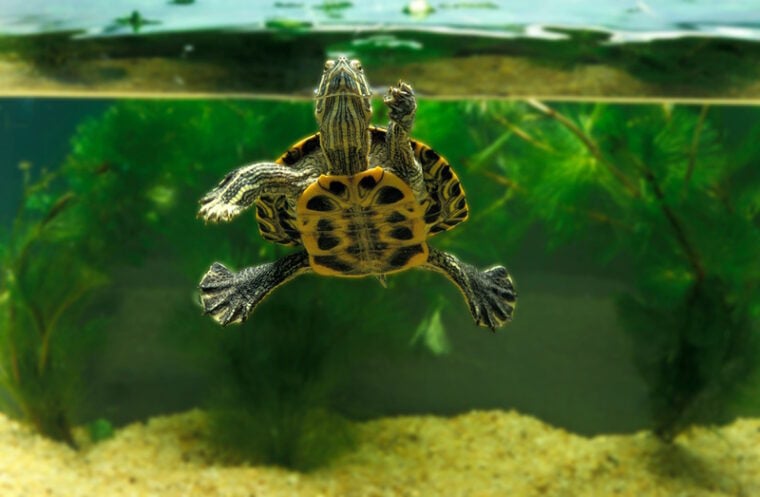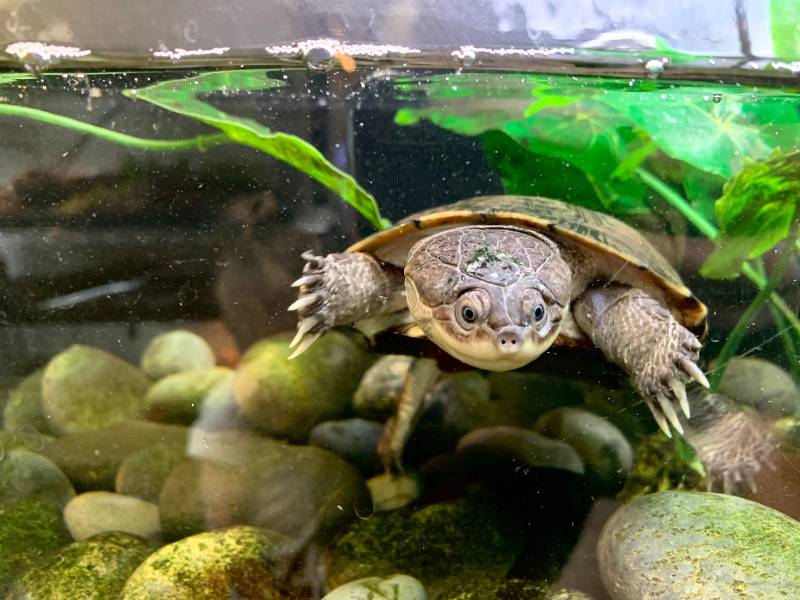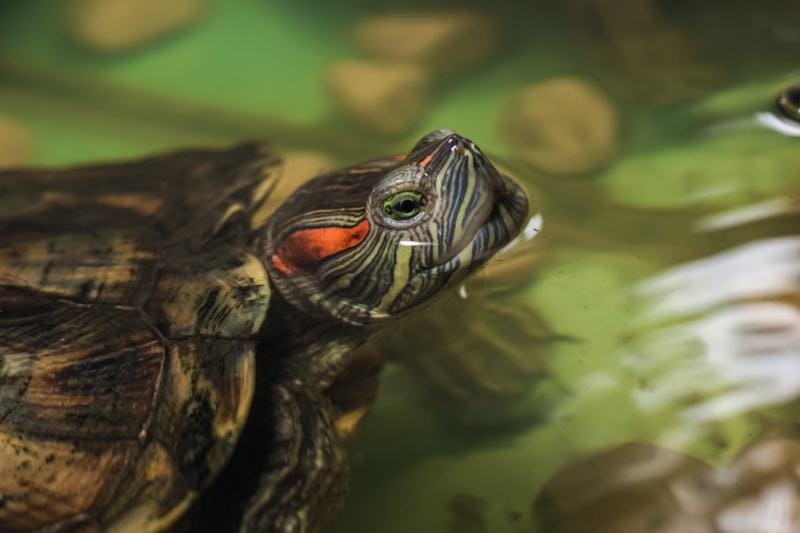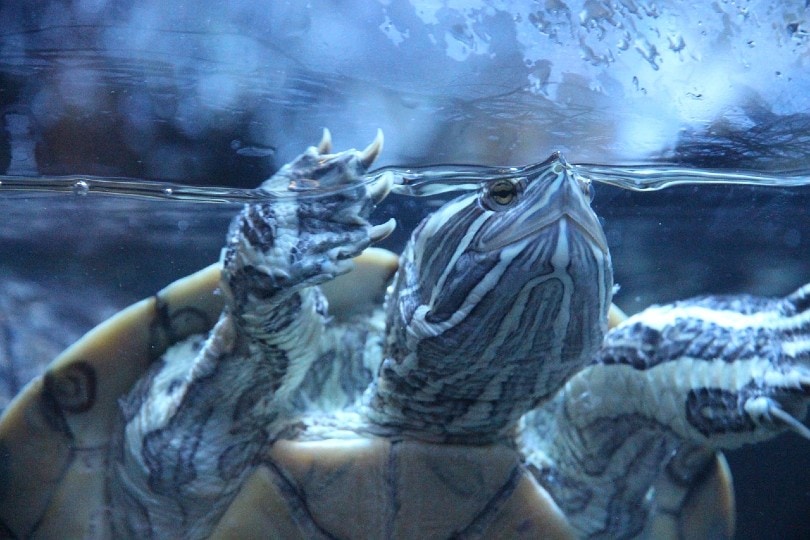
Turtle lovers around the world love nothing more than to watch these little characters paddling about in the water with those adorable, webbed feet. When it comes to taking care of these aquatic creatures, we have a real responsibility to look out for their needs. Unlike cats and dogs, they cannot easily come and alert us when they are feeling unwell or in distress. However, when you know what to look for, you will easily be able to recognize when your pet turtle is in trouble.
One behavior that can signal a turtle in distress is when they keep swimming against the glass of their enclosure. Of course, your turtle will occasionally paddle their way along the glass, exploring the perimeter of their habitat, but if you notice them spending more and more time swimming up against the glass, there is a problem.
In the following article, we will take a look at 10 reasons for your turtle’s worrying behavior and what you can do to help.
The 10 Reasons Turtles Keep Swimming Against the Glass
1. Their Enclosure Is Too Small
You may have spent hours and hours researching the optimal space for your pet turtle and have created a space for them to call home. There are a lot of helpful resources on the internet, in books, and at your local exotic pet specialist, but you will probably find that the recommendations will vary. This can be because some are using outdated resources but also because different species, even different individuals, will have specific needs. So, what is right for one may not necessarily be right for another.
The easiest way to talk about the space requirements of a turtle is to talk about tanks or aquariums. If you have a pond or other type of enclosure, you will need to extrapolate these measurements.
As a guide, a pet turtle needs to have at least 10–15 gallons (38–57 liters) of total tank space per inch. This measurement should be based on the expected adult length of your turtle, and this value is per turtle.
For example, if you have two painted turtles with an expected adult size of around 8 inches, you will need a 160-gallon tank, which is around 6 feet long. That’s a lot of tank! Many people don’t realize just how much space a turtle needs, especially when they bring them home when they are young and small.
2. Their Tank Is Too Large

While it is vital to make sure you have provided plenty of room for your turtle to grow, exercise, and explore, a very large tank can be a bit overwhelming for a small or juvenile turtle. If your turtle has a large volume of water to swim in, it is sensible to provide some resting spots, like platforms or logs, for them to take a break and have a rest.
3. There Is a Water Quality Problem
The water in your turtle’s tank can easily become stagnant or polluted with waste. Regular cleaning and water changes are essential for keeping your turtle’s water clean, and you should keep regular tabs on the pH and ammonia levels. This can be done using a simple test kit.
4. They’re Stressed
This can be an extension of the previous point, but there are a number of things that could be causing your turtle to become stressed in their habitat. If they are housed with other turtles or even other species, the pressure of competition or even predation could be causing your turtle to panic.
Additionally, look at the location of your turtle’s tank. Is it in a busy part of the house? Are there cats, dogs, or children regularly peering in? These are all reasons that could be triggering a stressful flight behavior in your shelled friend.
5. The Temperature Isn’t Right

Turtles are ectotherms, which means that their body temperature is dependent on that of their surroundings, and we are responsible for controlling that. Their water temperature needs to be kept at around 72–80oF, and the air temperature should be around 75–85oF, with a basking area set to around 75–90oF.
This should create a temperature gradient so that your turtle can move between different temperature zones to moderate their body temperature. You should also turn off the heat lamp in their basking area overnight to mimic natural temperature patterns.
Multiple thermometers and electric timers are essential equipment for any turtle tank, but they need to be checked regularly.
6. They Are Looking for a Mate
There comes a time in every animal’s life when nature starts telling them that it’s time to reproduce. If your turtle has reached sexual maturity, which can be from a few years old, depending on the species, they may just be searching for a mate.
7. They Are Unwell

Illness in turtles can appear in a number of different ways, depending on the illness or body system involved. Bacterial or fungal infections can occur in pet turtles, as can parasite infestations. If your turtle is unwell, they will likely show other signs of illness such as weight loss, inappetence, altered feces, or vomiting. If you think your turtle might be unwell, they need to be seen by a vet at once.
8. They Have a Vitamin Deficiency
Vitamin A deficiency is a relatively common ailment of pet turtles, resulting from being fed a diet that is not nutritionally balanced. Too many nutrient-poor vegetables, like iceberg lettuce, or even too much cooked meat can cause this deficiency. Hypovitaminosis A can lead to a number of clinical signs, including infections of the skin, shell, and respiratory system, and cause problems with balance and buoyancy.
Turtles are particularly susceptible to imbalances in their vitamins and minerals, so it is vital to provide your turtle with the right balance of foods to ensure their needs are being met.
9. They Are Old

Just like us, turtles will experience deficits as they become elderly, and this can impact their vision, coordination, and cognitive function. If your turtle is entering their geriatric years, it can be helpful to provide them with some additional resting points in their water in case they become disoriented and cannot easily make their way back to solid ground.
10. They Are Pregnant
Obviously, if your turtle is male, this will not apply! But if you have a female turtle that has mated in the past 2–3 months, they may be searching for a place to lay their eggs. Most turtles will lay their eggs in the dry land provided in their habitat, but if you suspect your turtle is searching for greener pastures, it might be worth providing a separate nesting tank with a deep substrate layer. This can also become the incubation and hatchling enclosure.
Final Thoughts
It’s not unusual for your pet turtle to explore their space, and this will include spending a bit of time paddling against the glass of their tank. However, if they are spending an unusual amount of time swimming against the glass, there is likely a reason for it.
In most cases, the problem is with the tank itself, and changing the temperature, the location, or even the size of their tank will put things right. There are several natural life changes that may cause your turtle to become preoccupied with the boundaries of their territory, but there are also health conditions that could cause this behavior. It is important to look at the whole picture to work out what might be the cause and to reach out to your veterinarian for advice when needed.
Featured Image Credit: slowmotiongli, Shutterstock.









